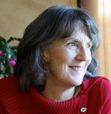Arleen Williams's Blog, page 12
March 31, 2017
Minding My Muse 06: Doing vs. Feeling
Priscilla Long’s Minding the Muse A Handbook for Painters, Composers, Writers, and Other Creators includes the following writing prompts at the close of the fifth chapter titled Feelings are Unimportant. I’ll admit I was taken aback by that title given I’m one who lives by emotion. But as with all of the writing prompts found in this book, I found the exploration fascinating. Perhaps you’ll give it a try yourself.
 Priscilla Long, Minding the Muse, p. 38
“Do you find your work process overly influenced by your feelings?
Are there times your feelings sabotage your work? Does your energy for working rise and fall according to your cycle of hope and discouragement?”
Priscilla Long, Minding the Muse, p. 38
“Do you find your work process overly influenced by your feelings?
Are there times your feelings sabotage your work? Does your energy for working rise and fall according to your cycle of hope and discouragement?” September 14, 2016My feelings are affected by life around me and my struggles to stick to some kind of regular writing schedule. My feelings also come into play with memoir in two ways. First, it’s a struggle to remember honestly and clearly the events and emotions of thirty years ago. I struggle to remember and to pull this Mexico story together. And I wonder if anyone cares, if there will be an audience. So I remind myself that I write for me, perhaps for Erin, so she knows her mother better.
Feelings also come into play, especially when I write memoir, because of my concern for the feelings of that small audience – my siblings – who will very likely read my work. The re-release of The Thirty-Ninth Victimis bad enough in their eyes, but Moving Mom followed by The Ex-Mexican Wives Club? They will not be happy that I’ve returned (as they’ll see it) to memoir. They don’t and won’t understand that I wrote Moving Mom back when Mom was still alive between 2008 and 2013. That I wrote as a tool to process those very difficult years. So I let my feelings, my fears, blind me. I try to read and edit with my siblings in mind. I try to figure out what will upset them most and I try to soften my words. This is not how a memoir should be written. Or perhaps it is. I should write with honesty and clarity, but I need not be cruel. Soon I’ll begin the re-read/edit of Moving Mom. It’s been awhile since I’ve looked at it. I’ll see it with new eyes and try to imagine how they will see it. So yes, feelings come into play.
Priscilla Long, Minding the Muse, p. 38 “Do you have way too many unfinished works? In what ways could you develop more resilience, a more steady and unflappable approach to working on your art?”
If anything, I do not have enough unfinished work. I am a finisher! I have The Ex-Mexican Wives Club that I am working on, and I have stories of Erin’s childhood that I may or may not choose to do anything with. That’s it. No other projects. According to P. Long I should probably have more, but I do not work in short forms. Well, not exactly true. I have a large collection of blog posts. I should/could review and rewrite them to create a collection: Observations on Life. Another collection: Muddling Memoir. Another (already collected into one solid piece that I think I submitted): Finding Home.
There are pieces to polish, pieces I could submit for magazine publication, but it has never interested me to do so. Maybe someday, but first I want to finish the long memoirs. After that, we’ll see.
March 31, 2017 UpdateAs I read that last unedited paragraph from six months ago, I ponder again about diversification and the importance of regular submissions. Teaching full time requires I prioritize my writing time. I allow feelings to shape my choices. My passion: book length work. Unlike others who devour essays and short stories, I always reach for a book. Books are what I prefer reading and what I enjoy writing. I can lose myself in books. So until retirement, I will continue in the same vein.
Prior posts in this series:Minding My Muse 01Minding My Muse 02Minding My Muse 03 Minding My Muse 04: Process or Product?Minding My Muse 05: Does That Count?
Published on March 31, 2017 11:47
March 17, 2017
Minding My Muse 05: Does That Count?
I work my way through a writing notebook from six months ago containing responses to the writing prompts Priscilla Long calls “Questions to Contemplate as You Continue Your Practice.” These prompts close each chapter of Minding the Muse: A Handbook for Painters, Composers, Writers, and Other Creators . I share my unedited responses as a tool for revisiting my writing process, a six-month checkup of sorts.
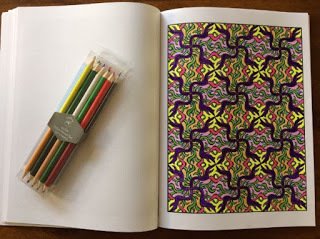 Priscilla Long, Minding the Muse, p. 33
“What artworks might you study outside the traditions of your own artform?
If you are a visual artist, what could you do with the shape of a sonnet? If you are a poet, can you write a painting?...”
Priscilla Long, Minding the Muse, p. 33
“What artworks might you study outside the traditions of your own artform?
If you are a visual artist, what could you do with the shape of a sonnet? If you are a poet, can you write a painting?...”September 2016I tried to teach myself perspective, tried to learn to sketch, but I got frustrated and gave up. I’d like to try again, take a class. Or maybe I should just play at it, try to imitate Rivera or Kahlo, use art to take me back to Mexico. A bouquet of Calla Lilies or a concrete block apartment building with coffee can tomato and chili plants on the roof top. Maybe I should try color. Maybe a class. When? Where? I will copy the Mexican artists to try to re-enter the world I left behind. I like that idea. With or without a class.
Priscilla Long, Minding the Muse, p. 33 “What traditional forms within your own domain might you return to , not to recreate old forms, but to explore the relevance of their moves to your new work (in painting, for instance, you might return to painting on a square canvas or to dripping paint or scraping it; in poetry you might try the pantoum or you might try working in couplets).”
September 2016 I will do a Mexico abecedarian, maybe two. One about Mexico, only descriptive. The other autobiographical. This/these would be fun, challenging and also serve to pull up memories.
I will also write an old fashioned letter once a month. I wrote a lot of letters when I lived in Mexico. Maybe beginning this tradition once again could reconnect me with the past. If nothing more, I might give surprise and pleasure to those I write to.
March 14, 2017 UpdateI’ve done no drawing or painting, though I did buy one of those adult coloring books I play with now and again. Does that count? I’ve also written a few letters, though I haven’t met my monthly quota. Still, I found the inspiration to keep writing which was my goal when reading Minding the Muse. The writing prompts above are from the fourth chapter: Finding and Reinventing Forms. While I am not drawing or painting, nor am I doing abecedarians or monthly letter writing, memories of my lost Mexico years are surfacing in color and image, and I’m rereading old letters and journal entries from three decades past.
Prior posts in this series:Minding My Muse 01Minding My Muse 02Minding My Muse 03 Minding My Muse 04: Process or Product?
Published on March 17, 2017 10:09
March 10, 2017
100 Miles for a Cure
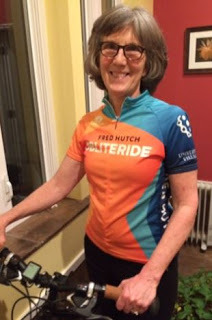 Cancer has hit my family and friends hard in the past few years. It’s hit the families and friends of many I know. Has it hit yours as well? Do you share my feelings of helplessness and frustration in the face of this dreadful disease?
Cancer has hit my family and friends hard in the past few years. It’s hit the families and friends of many I know. Has it hit yours as well? Do you share my feelings of helplessness and frustration in the face of this dreadful disease? I decided to do something proactive. This summer I will cycle the 100-mile Obliteride. The goal of this Seattle bike ride is to raise funds for Fred Hutchinson Cancer Research Center. Last year cyclists collected 2.4 million dollars in donations to support the search for a cure.
Here’s how it works. Each cyclist pays a $100 registration fee and agrees to a minimum $250 fundraising commitment to be reached by May 5. One hundred percent of that $250 goes directly to Fred Hutch cancer research. The cost of the ride itself – organization, support, jerseys – is covered entirely by the registration fee each cyclist pays.
I am grateful to those who have already donated to Fred Hutch and helped me get closer to my goal. But I’m not there yet, and frankly, with your help I’d like reach beyond that minimum goal of $250.
I know we all face choices in these uncertain times, but I’d sure appreciate your help. It’s quick and easy. Any amount helps! Just click HERE and give what you can to help obliterate cancer. Thank you!
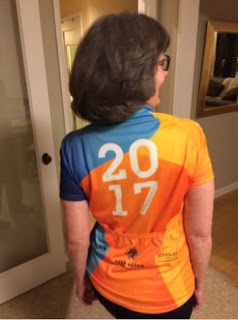
Published on March 10, 2017 07:52
March 3, 2017
Minding My Muse 04: Process or Product?
 Author and teacher, Priscilla Long provides thought-provoking writing prompts in Minding the Muse: A Handbook for Painters, Composers, Writers, and Other Creators. I used these prompts to pull myself out of a slump last September. I’m sharing my journal responses along with an invitation to write your own.
Author and teacher, Priscilla Long provides thought-provoking writing prompts in Minding the Muse: A Handbook for Painters, Composers, Writers, and Other Creators. I used these prompts to pull myself out of a slump last September. I’m sharing my journal responses along with an invitation to write your own. Priscilla Long, Minding the Muse, p. 25 “Do you find yourself thinking of results too early in the process? Does anxiety infect your work process? Do you spend time experimenting or do you find yourself in too much of a hurry?” Could you slow down? Could you fertilize your creative work by experimenting more?...”
September 13, 2016I am always in a hurry. I rush. I want a finished book. My focus is on the finished product rather than the process. The book on my book shelf. I rarely think about slowing the process. Fellow writers comment on my speed. Two memoirs and three novels between 2002 when I first began writing and today. But three novels between 2008 when The Thirty-Ninth Victim was released and 2015 when Walking Home came out. Six years for three novels plus the unpublished memoir. Really it doesn’t seem so fast. Many writers put out a book a year. But they are experienced writers and many are producing commercial work, and many are full-time writers. And besides it doesn’t matter.
What matters is that I feel rushed and that I do not explore and play with ideas. I don’t hone my craft because I am too focused on the story, whether fiction or memoir. I love story. I read and watch movies for story. I do not necessarily want experimental or new. Still, if I slowed down, I could dig deeper and write better.
Another factor is age. I began writing fourteen years ago at the age of forty eight. My first book was published when I was fifty four. I suppose I feel as though I’m running out of time. But what’s the rush? And who says I even have to write anything more? I do. I want to write better. I have three average to mediocre novels and two rather sensational memoirs. I’d like to learn to create something better. Literary? Not really. Unique? Perhaps. And to do that I should slow down.
Priscilla Long, Minding the Muse, p. 25 “Might you take an hour to work on a piece you have in progress, with the rule that this hour is to dibble-dabble, to play, to speculate, to chew, to cogitate? For this hour, no results will be desired and none will be permitted.”
September 13, 2016I guess I know how to “dibble-dabble” as well as I know how to play. What does dibble-dabble entail and how do I think about Mexico, remember Mexico, without a memoir in mind? Without results. It seems to not be in my nature. I do not know how to do anything at all without a goal, without results. Even relax. Maybe read. But even that became a practice, the need to write a review in hopes that others would review my books. Such a silly game.
 M – misery, mystery, markets, mansions, menace, music, me, men, Mrs., miserable, museums, mole, marriage, MaureenE – extranjera, exciting, exhausting, exhaust, ex-pats, extremes,
M – misery, mystery, markets, mansions, menace, music, me, men, Mrs., miserable, museums, mole, marriage, MaureenE – extranjera, exciting, exhausting, exhaust, ex-pats, extremes,escape, empty, educationX – Xochimilco, x-rated, x-raysI – ignorance, independent, interesting, international, intriguing,
ill, IxtapaC – concrete, creative, crafts, colors, chilis, carne, chickens, companeros/as, colegio, CoyoacanO – oil, old, oddities, Oaxaca, offices
I don’t think an Abecedarian would be considered dibble-dabbling, but just playing with MEXICO was fun.
How do you handle the process or product equation in your own creative endeavors? How do you experiment or dibble-dabble? Please share your thoughts in the Comments box below.
Prior posts in this series:Minding My Muse 01Minding My Muse 02Minding My Muse 03
Published on March 03, 2017 07:43
February 27, 2017
Minding My Muse 03
This Minding My Museblog series continues as I share my unrevised, unedited responses to author and teacher, Priscilla Long’s thought provoking promotes at the close of each chapter of Minding the Muse: A Handbook for Painters, Composers, Writers, and Other Creators.
Priscilla Long, Minding the Muse, p. 19 “Do you spend part of your work time consciously gathering, consciously dabbling and doodling, collecting, ruminating? Are there ways you could deepen your art practice and make it more pleasurable by putting into place a gathering phase, one that continues as composing begins? What sorts of materials might you gather and where might you keep those materials?
September 2016Gathering (or research) is very much a part of my practice whether I’m doing memoir or fiction. I gather before and during a project. I gather historical facts, relics, music, food, photographs, letters, memories. I’m in that stage now with the Mexico memoir, pulling and gathering relics in hopes of also gathering lost memories and trying to make sense of that lost young woman on her own in Mexico. I listen to music and memories surface. Look at photos. Read letters. I shall give myself more time to sink deep into the memories. This needs to be alone work. Maybe Saturday mornings when Tom is working and I have the house alone. Or Fridays. Will Pam be able to shift to Friday morning writes? Will I/we go to Louisa’s on Fridays? Or Tuesdays?
So I gather, but perhaps I could be better at organizing and storing the results of my gathering. I have letters and photo albums downstairs, but I think I’ve pulled out everything relevant and this is in baskets in my office. The music is here in the dining room. So far it all seems to work. What doesn’t work are the time lapses. I need to re-enter and stay there on a daily basis. I have to BE in Mexico in the early 80s. If I can BE there, the manuscript will develop. But to do that, I need to clear my plate. Republish four books, publish a second memoir. Then onward.
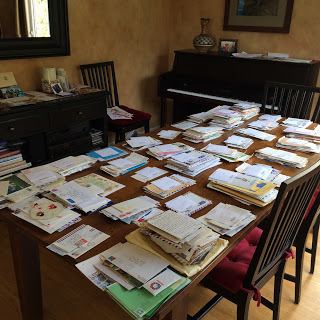 Priscilla Long, Minding the Muse, p. 19
“If you are one of those creators who loves research,
do you work on the actual composition—whether poem, painting, or film—at the same time that you continue doing research? Is the composing phase in sync with the gathering phase, or do you continue to do research for days or years without working on the work itself? Can you improve your practice in this regard?
Priscilla Long, Minding the Muse, p. 19
“If you are one of those creators who loves research,
do you work on the actual composition—whether poem, painting, or film—at the same time that you continue doing research? Is the composing phase in sync with the gathering phase, or do you continue to do research for days or years without working on the work itself? Can you improve your practice in this regard?September 2016I do both at the same time. For the Mexico memoir I needed, and still need, to do more upfront gathering because the memories are so weak. The challenge is that I did so much gathering and composing early last spring and early summer, but because I got so distracted, I’ve lost the string of the story.
I need to begin againBut not yetLet the dust settleLet summer endLet me begin again with a daily writing routineLet me celebrate the re-release of four (improved) booksLet me prepare Moving Mom and submit it for publicationLet me reward myself for these five books when they are all in printLet me sink deep into 1980s Mexico, the young woman I once wasLet me begin this re-entry during winter breakLet fall quarter be a time of daily composingOf editing and submissionOf regular blog postsLet me become again the writer I want to be Without fear of the pain my words may cause Let me not censure myself or my experiences or my wordsOut of fear, love or respect For those who have suffered and are suffering stillI will find the strength to tell my stories With honesty and patience and passionKnowing I risk rejectionI have to accept that rejection and keep writingBecause when I do not write, I am only half me.
Prior posts in this series:Minding My Muse 01Minding My Muse 02
Published on February 27, 2017 07:00
February 20, 2017
Minding My Muse 02
By the end of last summer I found myself in a serious writing slump. That’s when I found Priscilla Long’s wonderful new book titled Minding the Muse: A Handbook for Painters, Composers, Writers, and Other Creators . I spent September reading and responding to the writing prompts at the end of each chapter. With Priscilla’s permission, I will post those prompts and my unedited responses over the next weeks.
Priscilla Long, Minding the Muse, p. 11“ What is your work practice? Do you work every day? Do you place various unattainable conditions on when, where, or how you can work, resulting in a sporadic work habit? If so, how might this be improved?”
September 12, 2016I am not working every day. I have done little actual new writing this summer, though I have completed a load of editing – four manuscripts represent a fair amount of work! It’s the morning pages and timed writing I’ve let slide, the creation of new work. In part because I want the old work re-published and in part because the new memoir is slow in coming.
I definitely place conditions on the where or when or how that I write. I feel I need to do morning pages in the morning! And when I don’t, I can’t seem to find another time to get that private writing into my routine. Maybe I could get fifteen minutes in bed instead of reading at night if I’ve skipped morning pages or thirty minutes in my campus office before leaving for home. But more importantly, I need to explore how to use the timed write/morning pages to re-enter the memoir and to create new work for the blog.
Priscilla Long, Minding the Muse, p. 11“What specific products do you aim to achieve during your next period of work (week, month, year)? What are the steps to achieving them? “
September 12, 2016My next project is to read, edit, and submit Moving Mom. Possibly change the title. First I’ll read Marcellafor Pam and share my thoughts. I’ll try to do that this week and next Moving Mom I’ll aim for Christmas, or by the end of winter break. To do that I need time at my computer reading. This is not morning pages time. This will be Fridays and Saturdays, and maybe scheduled afternoons.
At the same, I need to re-enter the Mexico memoir enough to establish startlines. These, as well as exercises from What if? These could be my startlines for Louisa’s (Fridays?) and Uptown practices.
Priscilla Long, Minding the Muse, p. 11 “Do you work on more than one piece at a time? Do you allow the pieces to interact with each other and influence each other?”
September 12, 2016The only short pieces I do are for my blog. I tend not to submit short pieces, though I know Priscilla would insist I should. At the same time, I do let my blog and my long project (memoir or novel) as well as morning pages interact and influence each other so I suppose that’s on target. My biggest challenge is to re-enter the world of daily writing, daily focused writing. Once I do that, and once I feel my publishing schedule is as it should be, I should be able to re-enter The Ex-Mexican Wives Club as well as weekly or bi-weekly blog posts.
Priscilla Long, Minding the Muse, p. 11 “When you next complete a work, what will you do to reward yourself?” Which work will this be?”
Rewards? I’m not so good at rewarding myself. I suppose I see the book itself as the reward, or the number of views to a blog post. I see writing as a hobby rather than a job; completion makes me happy. It’s its own reward.
But then people comment on my productivity, speed, publications. Maybe I do need, or needed a break. A reward. Maybe that’s why I haven’t succeeded yet to dig deep into the Mexico years and find the story, the memories there that are needed for this third memoir. Maybe I needed this summer of distraction – Erin’s wedding, a houseful of friends and family, Booktrope going under, taking the time to re-edit before re-releasing with Bookadelphia. It’s been a long summer break from creation, and soon I need to return.
February 20, 2017 UpdateI am slowing re-entering the world of Mexico 1979-1985. I continue to gather memories, and I’ve made contact with an old friend I once knew there, a friend with whom I share memories. But I question how far I should go with this searching for details through another’s memories. John Irving addresses this quandary in his memoir, The Imaginary Girlfriend:
“Of course I could phone Andre Dubus and ask him if it was his chest or Crumley’s that was splattered with Boston cream pie; I could call David Plimpton and ask him if he threw the pie, and whose chest he hit. But I believe the gaps and even the errors of my memory are truthfulness of another kind: what we fiction writers forget, or what we get wrong, is part of what a “memoir” means to us.”
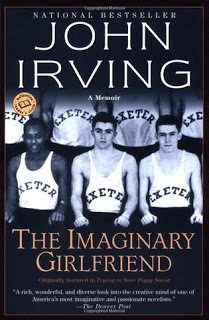
Prior posts in this series:Minding My Muse 01
Published on February 20, 2017 09:43
February 14, 2017
Minding My Muse 01
2016 was a year full of extreme joy and deep grief. Through it all I was in a serious writing slump. I suppose it happens sometimes. It was not writers block, but more like an angst-ridden teen’s What for?
In September I looked at the coming of fall gray, the start of a new academic year, the state of the country and the world, the delays in the re-release of my books, the losses of loved ones, the fears related to memoir, and I understood this slump.
But maybe that wasn’t the point. Maybe dissecting and understanding didn’t matter. Perhaps I simply needed the discipline of any writer worth her or his salt to put my butt in the chair every single day, close out the world, and put pen to paper to tell a story.
On September 1, 2016, Seattle author and teacher, Priscilla Long, released Minding the Muse: A Handbook for Painters, Composers, Writers, and Other Creators . It’s a gem for experienced writers whose practice has, for one reason or another, gone sideways. The book has fourteen chapters, each ending with writing prompts. It was exactly what I needed to put my butt back in the chair.
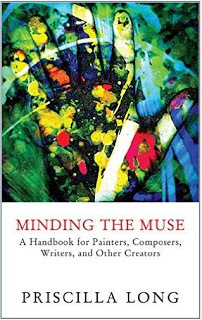 I wrote in a flurry through September, responding to the bulk of the prompts provided. By the time my fall teaching quarter began, I was no longer working my way through Minding the Muse, but writing my memoir again. I owe a debt of gratitude for the direction Priscilla’s work provided. With her permission, I’ll post my responses to her probing questions over the next weeks. To be true to the process, I’ll share these unrevised, unedited raw responses, taken directly from my writer’s notebook. In some cases, I’ll add updates to these 5 or 6 month old writings.
I wrote in a flurry through September, responding to the bulk of the prompts provided. By the time my fall teaching quarter began, I was no longer working my way through Minding the Muse, but writing my memoir again. I owe a debt of gratitude for the direction Priscilla’s work provided. With her permission, I’ll post my responses to her probing questions over the next weeks. To be true to the process, I’ll share these unrevised, unedited raw responses, taken directly from my writer’s notebook. In some cases, I’ll add updates to these 5 or 6 month old writings.Priscilla Long, Minding the Muse, p. 2“Peruse these chapters in any order that strikes your fancy. I suggest beginning a notebook in which to reflect on your own art practice. On each subject, begin by describing what the reality is right now, since our efforts to move forward must necessarily proceed from a good comprehension of reality. Write for ten minutes on your present situation (‘My current situation with regard to – is …’). Do not stop. Do not worry about correctness or eloquence. Then write for five more minutes in response to the question: How can I make my practice in this area more effective by 5 percent?”
September 11, 2016 My current situation with regard to my writing practice is fairly nonexistent. I have written nothing new on the third memoir since early summer, and even my blog posts have dwindled. Still, I have read, edited and submitted all three novels and the first memoir to Bookadelphia for re-release. So that’s something. It’s work. It’s reading and editing, but it’s not creating, and I do miss creating. In all fairness, I suppose I needed a break from working so hard for so long, and then there was, still is, Erin and Elliott’s wedding with all the prep and house guests, etc. But I haven’t been doing morning pages, and now I’m looking at the clock because ten minutes feels like forever and my arm and hand are sore from lack of daily writing. I fear I have nothing more to say, that I’ve written all there is inside me. But I know that’s not true either. I’m a writer, but I’m not writing. I need discipline, and discipline went out the window this summer despite my early attempts at practice retirement. It’s so easy to let a day slip away, to write all of one day and do nothing the next. And I agree with Priscilla that daily practice is the key whether it’s fifteen minutes or four hours or anything in between. The DAILY is the key. I also know I need structure.
September 12, 2016I don’t know how to measure 5% improvement, but I do know that I need to improve my practice and that the first step is by simply writing. I need to write daily and I need to find a schedule I can stick to whether I’m teaching full time or on break or traveling or whatever. I think that, no I know that what has worked in the past (and could work again!) is to do morning pages. Thirty minutes of writing every single morning first thing when I wake up. Coffee and pen and notebook. I also need to avoid that my morning writing become nothing more than a daily To Do list or a list of complaints about life. I want to write scenes or do character development for the next memoir or write blog posts.
February 12, 2017 UpdateFall quarter went well, winter break passed, now I’m in the depths of winter term. I get up most mornings at 6:00 to do a 30-minute timed write before leaving for campus. Fridays I type and rewrite. My current memoir project, The Ex-Mexican Wives Club,remains a challenge, but it’s coming along. I’m at 31,169 very rough words, and I feel confident I have a story to tell.
Published on February 14, 2017 07:10
February 9, 2017
Staying in the Depths
My latest project, a memoir about my years as an ex-pat, is a bit like trying to swim in a cold mountain lake after a long hot hike. I want to get in. I know it will feel good. I’m certain I won’t regret it. I dip a toe in and pull back. I walk in up to my knees and run out. I just can’t get all the way in. So it goes with this memoir. What’s holding me back? What’s keeping me from diving in and staying in the depths until I complete the first draft?
Perhaps it’s the subject matter: memories buried deep by time, distance and language.
Perhaps part of me resists re-entering the world of that lost young woman searching for self in a foreign land.
Perhaps I struggle to face the truths and lies of that younger me, to look her in the eye and offer acceptance, understanding, even forgiveness for the pain she caused.
Perhaps denial is easier than facing the loss of friends once so dear who have slipped through the fingers of time.
Perhaps I have nothing to say.
Are these challenges personal or inherent to memoir writing? Perhaps a bit of both. For me, the solution is found in discipline: diving in and staying in the frigid water until the work is done.
If you’re in the Seattle area, I hope you can join me this Saturday to discuss and practice memoir writing.

Writing Memoir: What? Why? How?
Mountlake Terrace Library
23300 58th Ave W
Mountlake Terrace, WA
Saturday, February 11, 2017
10:30 a.m. - 12:30 p.m.
Published on February 09, 2017 18:50
January 6, 2017
Louisa’s Lost
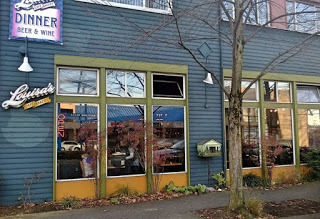 I sat pen in hand at a location that felt wrong. It was not Louisa’s Café & Bakery. In the final month of 2016, Louisa’s Café & Bakery went out of business.
I sat pen in hand at a location that felt wrong. It was not Louisa’s Café & Bakery. In the final month of 2016, Louisa’s Café & Bakery went out of business.I began writing at Louisa’s. I became a writer at Louisa’s. I came of age – in a belated, arrested development, weird sort of way – at Louisa’s. I owe it all to Jack Remick and Robert Ray.
It began in a memoir class offered through the University of Washington Extension Program. No, it began the evening I dragged my depressed self into an orientation session. As Jack described the course and answered questions, his gray pony tail hanging over the collar of a black turtleneck, I felt his authenticity and an odd combination of nonchalance and intensity. He cared and he didn’t care. He was there to teach not to counsel, guide by example not by dictate. I doubt Jack remembers our brief conversation that evening. I will never forget it. It changed my life.
It was a 3-quarter program co-taught by Jack and Bob. The first night I was introduced to timed writing. At the end of the first quarter, Bob and Jack told the class about an open writing practice at a place called Louisa’s Bakery and Café. Anyone serious about putting pen to paper for thirty minutes of intense practice was invited.
I remember walking through the glass front door of Louisa’s Café & Bakery for the first time. I remember the funky painted wood tables and the welcoming smiles of the strangers who filled the chairs. I wrote. I read. I returned.

A ski accident during the second quarter slowed my writing, but I returned to class on crutches and eventually made it back to Louisa’s. Again I felt welcomed and safe. When I shed tears while I read, decades of tears for a murdered sister, my tears were accepted. By the end of the second quarter, my professors told me I had a potential book and encouraged me to keep writing.Two years later I signed a publishing contract and continued writing.
As the years passed, a personal practice emerged. timed writing worked well for drafting new scenes and blog posts, for meta writes and figuring stuff out. It didn’t work so well for editing and revision. Not for me anyway. For that I stayed home at my computer. But I could never stay away too long because Louisa’s was about more than simply scrawling words on paper. It was a community of like-minded people sharing a table. It was support and creativity and community.
I will never forget when this community came to their collective feet in applause the day I arrived, The Thirty-Ninth Victim in hand, just as I will always remember that hot spring day in 2008, a feeble fan blowing overhead, Louisa’s packed with fellow writers and friends as I launched my first book into the world. That was a special day, a huge day, a Louisa’s day.
Over twenty years ago Jack and Bob started writing together and welcoming others to join them. Fourteen years ago I garnered the nerve to accept their invitation. Now Louisa’s Café & Bakery is gone. I think we need a good old-fashioned Irish wake, but maybe that’s just me. Maybe it’s just a change, not a loss. But I cannot yet convince myself that such is the case.
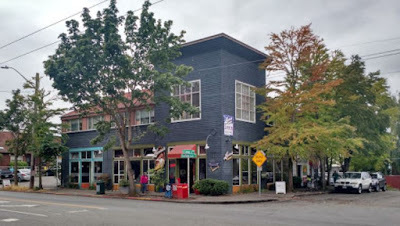
Published on January 06, 2017 12:21
December 16, 2016
A Talk Revisited (in Video)
It was a rainy cold Friday evening. The audience was sparse, maybe nine or ten including the organizers. I spoke for over an hour and they stayed with me. I could feel the connection and was grateful for their interest.
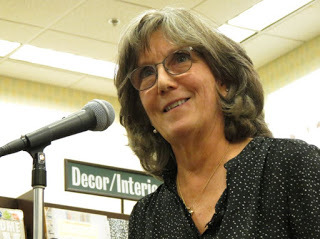 Southwest Seattle Historical SocietyI would like to thank Dora-Faye Hendricks of Words, Writers and West Seattle who invited me to speak, Clay Eals of the Southwest Seattle Historical Society who coached me well, and Barnes & Noble - West Seattle who hosts this series on the first Friday of every month.
Southwest Seattle Historical SocietyI would like to thank Dora-Faye Hendricks of Words, Writers and West Seattle who invited me to speak, Clay Eals of the Southwest Seattle Historical Society who coached me well, and Barnes & Noble - West Seattle who hosts this series on the first Friday of every month.
I am also grateful to Klem Daniels Productions for filming my talk, Life + Inspiration = Fiction, in its entirety. So grab a cup of coffee and enjoy!
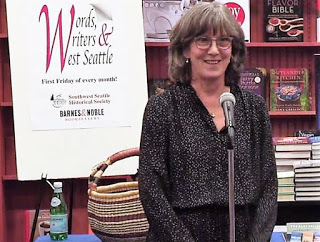 Life + Inspiration = Fiction, Klem Daniels Productions
Life + Inspiration = Fiction, Klem Daniels Productions
 Southwest Seattle Historical SocietyI would like to thank Dora-Faye Hendricks of Words, Writers and West Seattle who invited me to speak, Clay Eals of the Southwest Seattle Historical Society who coached me well, and Barnes & Noble - West Seattle who hosts this series on the first Friday of every month.
Southwest Seattle Historical SocietyI would like to thank Dora-Faye Hendricks of Words, Writers and West Seattle who invited me to speak, Clay Eals of the Southwest Seattle Historical Society who coached me well, and Barnes & Noble - West Seattle who hosts this series on the first Friday of every month.I am also grateful to Klem Daniels Productions for filming my talk, Life + Inspiration = Fiction, in its entirety. So grab a cup of coffee and enjoy!
 Life + Inspiration = Fiction, Klem Daniels Productions
Life + Inspiration = Fiction, Klem Daniels Productions
Published on December 16, 2016 08:09

